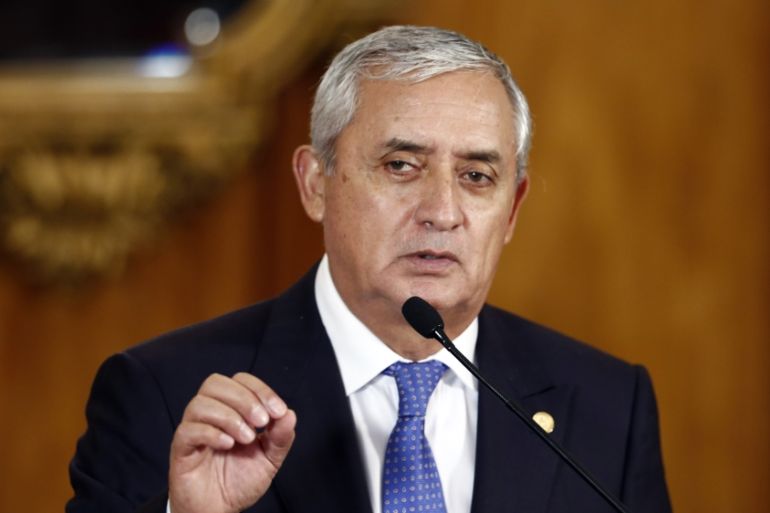Anti-corruption mood sweeps Guatemala’s political class
Guatemalans feel impunity no longer reigns in their country following president’s resignation over graft scandal.

Guatemala City – There’s a fresh mood sweeping through Guatemala. Tens of thousands of people have in recent months taken to the streets in peaceful protests. And now, they’ve got what they were calling for.
Their former president, Otto Perez Molina, is in court being questioned over his alleged involvement in a massive corruption scandal, dubbed “La Linea” or “The Line”, in which importers gave bribes to avoid paying customs duty.
Immunity lifted
Earlier this week, Congress voted to lift Molina’s immunity from prosecution. That opened the door to a string of events from which Guatemala is still reeling. The following day, a warrant was issued for the president’s arrest. A few hours later, he resigned.
He was in court the next day and was remanded in custody because of fears that he might flee the country – moving from the presidential palace to a jail cell in just a few days. The inquiry continues until the judge decides whether a full trial should go ahead. Molina says he’s innocent.
The attorney general, Thelma Aldana, who ordered the arrest warrant, told Al Jazeera that she has more than ninety thousand recorded telephone messages and enough evidence to try the man who appointed her last year. She’s clear what her role is.
“We have to reform the laws,” she said. “But also our attitudes to strengthen our institutions to make it clear that no one is above the law.”
Pressure on politicians
The new interim president, Alejandro Maldonado, sworn in on Thursday, also backs the changes. He was the vice president who only took office in May when his predecessor, Roxana Baldetti, resigned after accusations that she too was involved in “La Linea”.
President Maldonado called on protesters to remain vigilant – not to relax. “This is an opportunity,” he said.
“They cannot rest, they must keep the pressure on the politicians, the media must keep investigating, and the people must accompany them. If they go back to sleep, the corruption will return because it’s a plague which infests everything.”
He will only hold office for 133 days until a new president is chosen during elections expected to run over two rounds. Recent events have obliged the long list of candidates to emphasise their honesty and condemn corruption.
But the Guatemalan electorate has grown cynical and suspicious of both politics and politicians.
Corruption scandals are nothing new in Guatemala or much of the rest of Latin America. What’s different in Guatemala now is that impunity no longer reigns. Heads – important heads – have rolled.
Indignant demonstrators marching to protest against corruption scandals in Brazil and Chile are watching with interest.
Berdardo Silva, one of the protest leaders celebrating outside the court in Guatemala City where Molina was being questioned, said: “We’ve been demanding the resignation of corrupt politicians. Now we’ve seen the resignation of the leader of a band of corrupt officials – Otto Perez Molina – who happened to be the president of Guatemala.”
Political purity
Among the opinion polls, favourites in the elections are two experienced politicians trying to convince voters that they’re clean in what many see as a dirty game. They’re Sandra Torres, the ex-wife of former President Alvaro Colom and Manuel Baldizon, defeated by Molina in the 2012 elections.
The other clear leader is television comedian, Jimmy Morales, whose main attraction is his lack of political experience – his political purity.
Protesters have named recent events the “Guatemalan Spring” – they’re now nurturing the seeds they helped to plant and waiting nervously for them to flower.